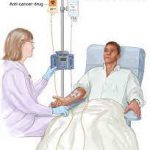The basics
Carboplatin is used alone or in combination with other medications to treat cancer of the ovaries (cancer that begins in the female reproductive organs where eggs are formed) that has spread to other parts of the body, not improved, or that has worsened after treatment with other medications or radiation therapy.
Carboplatin is in a class of medications known as platinum-containing compounds. It works by stopping or slowing the growth of cancer cells.
Let us walk you through key things you need to know about carboplatin.
Make sure you read IMPORTANT WARNING section at the end of this article.
How should I take carboplatin?

Carboplatin is injected over at least 15 minutes intravenously (into a vein) by a doctor or nurse in a medical facility. It is usually given once every 4 weeks.
Your nurse usually gives you anti-sickness (anti-emetic) drugs before the chemotherapy. The chemotherapy drugs can be given through:
- a short thin tube the nurse puts into a vein in your arm or hand (cannula)
- a fine tube that goes under the skin of your chest and into a vein close by (central line)
- a fine tube that is put into a vein in your arm and goes up into a vein in your chest (PICC line).
Be sure to tell your doctor how you feel during your treatment with carboplatin. You can help them by tracking your side effects in Ankr.
What are the side effects of carboplatin?
Common side effects
- Nausea
- Vomiting
- Diarrhea
- Constipation
- Sores in the mouth and throat
- Pain, burning, or tingling in the hands or feet
- Pain, itching, redness, swelling, blisters, or sores in the place where the medication was injected
- Hair Loss
- Weakness
- Loss in ability to taste food
Serious side effects
- Pale skin
- Unusual tiredness or weakness
- Fainting
- Dizziness
- Sudden changes in vision, including color vision
- Decreased urination
- Swelling of the face, arms, hands, feet, ankles, or lower legs
- Shortness of breath with everyday activity or when lying flat
- Ringing in ears and difficulty hearing
Carboplatin may cause other side effects. Call your doctor if you have any unusual problems while taking this medication. If you experience a serious side effect, you or your doctor may send a report to the Food and Drug Administration’s (FDA) MedWatch Adverse Event Reporting program online or by phone (1-800-332-1088).
Use the free Ankr platform or Ankr app to track your symptoms.
What special precautions should I follow?
Before receiving carboplatin injection
- tell your doctor about your allergies
- tell your doctor about other intakes
- tell your doctor if you have or have ever had any disease, symptom, or treatment
- tell your doctor if you are pregnant, plan to become pregnant, or are breast-feeding. You should not become pregnant or breast-feed while you are receiving carboplatin.
While you are on Carboplatin
- If you become pregnant while receiving carboplatin, call your doctor. Carboplatin may harm the fetus.
In case of an emergency/overdose
In case of overdose, call the poison control helpline at 1-800-222-1222. Information is also available online at https://www.poisonhelp.org/help. If the victim has collapsed, had a seizure, has trouble breathing, or can’t be awakened, immediately call emergency services at 911.
Symptoms of overdose may include:
- Black, tarry, or bloody stools
- Bloody vomit or vomited material that looks like coffee grounds
- Unusual bruising or bleeding
- Decreased urination
- Pain, burning, or tingling in the hands or feet
- Ringing in ears and difficulty hearing
Brand names
- Paraplatin®
Other names
- CBDCA
Last Revised – 06/29/2023, FDA-updated- 09/15/2021, SG
Carboplatin injection must be given in a hospital or medical facility under the supervision of a doctor who is experienced in giving chemotherapy medications for cancer.
Carboplatin can cause a severe decrease in the number of blood cells in your bone marrow. This increases the risk that you will develop a serious infection or bleeding. If you experience any of the following symptoms, call your doctor immediately: fever, sore throat, chills, ongoing cough and congestion, or other signs of infection; unusual bleeding or bruising; black and tarry stools; red blood in stools; bloody vomit; vomited material that looks like coffee grounds.
Carboplatin may cause severe allergic reactions. If you experience an allergic reaction to carboplatin injection, it may begin within a few minutes after your infusion starts, and you may experience the following symptoms: hives; skin rash; itching; reddening of the skin; difficulty breathing or swallowing; dizziness; faintness; or fast heartbeat. Tell your doctor immediately if you experience any of these symptoms.
Keep all appointments with your doctor and the laboratory. Your doctor will order certain tests before, during, and after your treatment to check your body’s response to carboplatin. Your doctor may need to stop or delay your treatment if you experience certain side effects.
Get 24×7 support for carboplatin
Don’t go through your cancer journey alone. Use Ankr to:
(1) find the best treatment for your cancer, and
(2) get advanced warning to cut side effects by upto 52%
